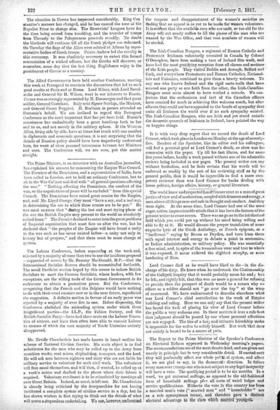Lord Cromer died as he would have liked to die—in
the dis- charge of his duty. He knew when he undertook the Chairmanship of the Gallipoli Inquiry that it would probably mean his end; bud he felt, and rightly felt, that this was no more a ground for refusing. to preside than the prospect of death would be a reason why an officer or a soldier should not " go over the top " at the warp of command. We have endeavoured to describe elsewhere what was Lord Cromer's chief contribution to the work of Empire building and ruling. Here we can only say that the present vniter has found the task of placing his view of Lord Cromer befcire the public a very arduous one. In these matters it is as a rule best that judgment should be passed by one whose personal affections are not engaged. The ties of a long and intimate friendship make it impossible for the writer to satisfy himself. But work that door not satisfy is bound to be a source of pain.






































 Previous page
Previous page